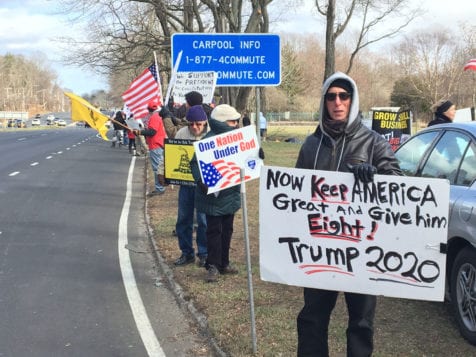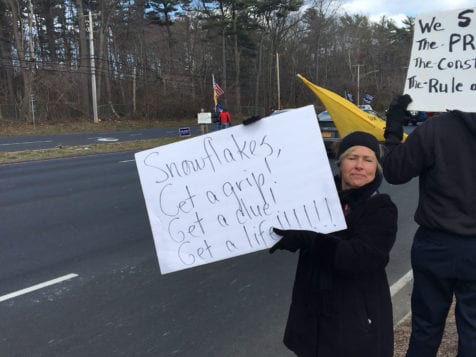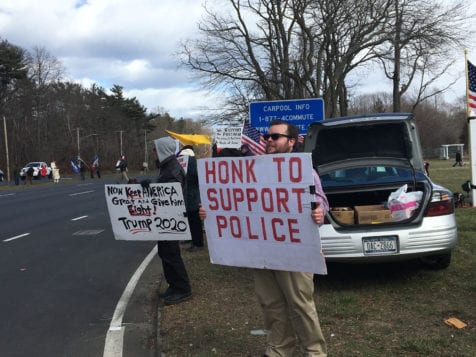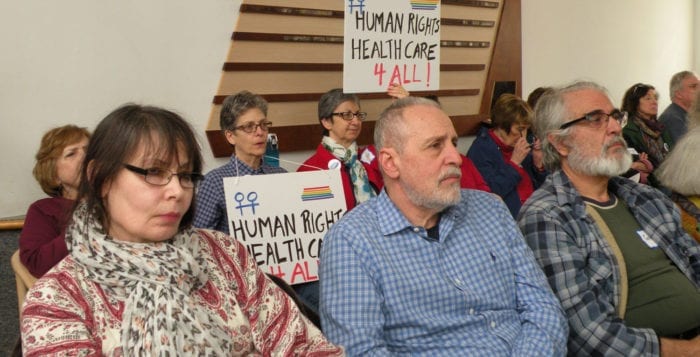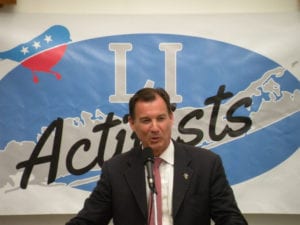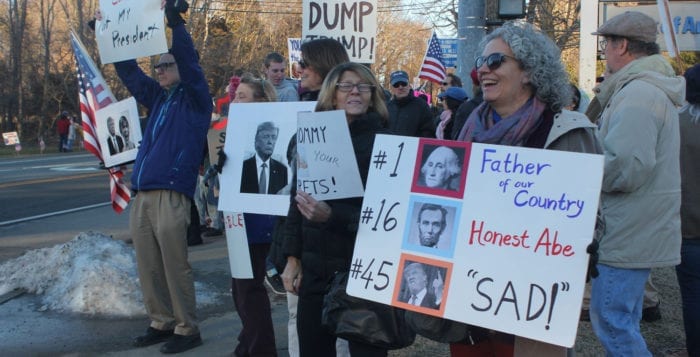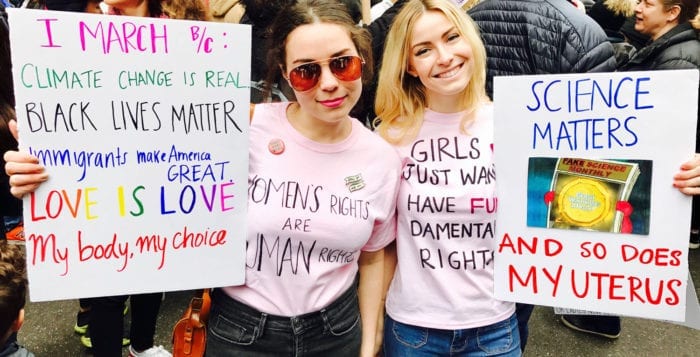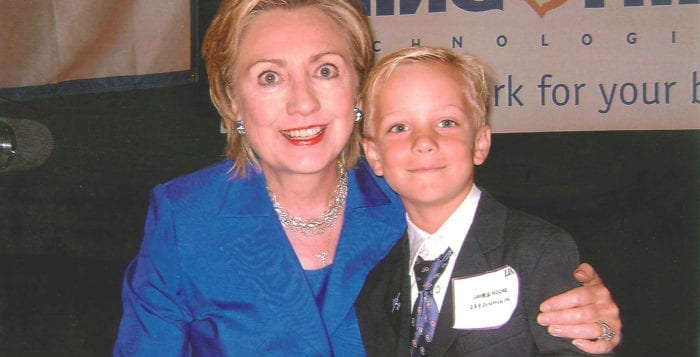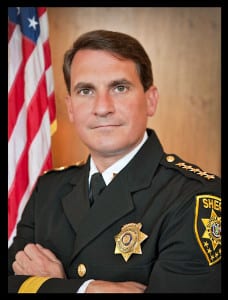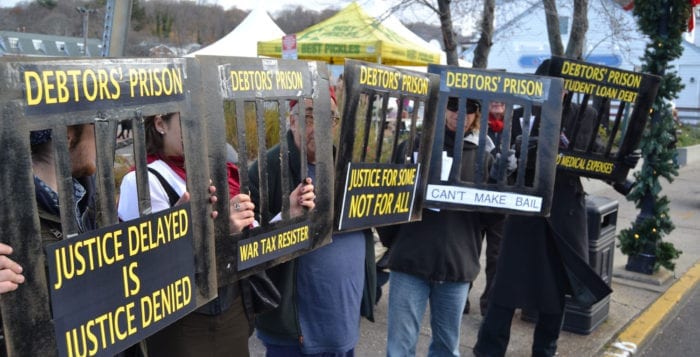Not to be outdone by the uprising of left-leaning activists who have made their displeasure known across the United States since President Donald Trump’s (R) inauguration, supporters of the president congregated March 4 to present a united front in backing Trump.
A group called Main Street Patriots organized the rallies, titled the Spirit of America Rally, which took place in 32 states and Washington D.C. The only rally held in New York took place outside of the H. Lee Dennison Suffolk County Executive office in Hauppauge and was organized and promoted in part by the Conservative Society for Action, a Patchogue-based group founded in 2008 whose website says has about 900 members.
“We need to stand united with our president who wants to do something to fix America,” a website set up to promote the Suffolk County event stated as part of its mission.
Judy Pepenella, a Patchogue resident and the national coordinator for the CSA, said she tried her best to spread the news of the rally on social media. She estimated about 350 to 400 people attended the Hauppauge rally.
“Spirit of America is the spirit of the Constitution, the spirit of the rule of law, the spirit of the goals and the directives and the original intent of the founding fathers,” Pepernella said, explaining how her group got involved. “We do stand behind our president — some people, more, some people less. But he won, we want to give him a chance.”
The rally came as the heat was being turned up on Trump’s Attorney General Jeff Sessions, who multiple news outlets reported last week had meetings with a Russian Ambassador despite Session’s testimony during his confirmation hearing he had no contact with Russian officials during the campaign. Rallies, protests and contentious town hall meetings featuring activists opposing Trump’s agenda and policies have taken place across the U.S. in recent weeks.
Pepernella said the group’s mission is not to blindly defend all of Trump’s policies or words, or her congressman — U.S. Rep. Lee Zeldin’s (R-Shirley) — for that matter, but she said it’s refreshing to hear a politician “call a spade a spade.” Zeldin has publicly supported Trump for months.
“Just because [Trump] said so doesn’t mean it’s right,” she said. “If it doesn’t work with the Constitution; if it infringes on a person’s rights; if it’s going to hurt somebody socially, economically and a person in need … he’s going to hear from us. It’s not a just ‘we blindly support the president’ — we support the president’s goals and his platform and mission statement to make America great again.”
Pepernella, who said she has yet to hear anything from Trump that would cause her to raise an eyebrow so far in his presidency, attributed outrage of Trump’s words and actions to people not being used to a New Yorker telling it like it is.
“We are all New Yorkers, and there’s a problem with New Yorkers, and I say that as a native New Yorker,” she said. “We have a bit of a tenacity and a bit of a brazen, ballsy-ass attitude — forgive my French — but that’s what we have. Donald Trump was born in Queens. He’s born and raised here. He’s a New Yorker and we can sometimes say things that are not perfectly correct, but that’s who we are. It doesn’t bother me. I have no problem with his rhetoric.”
Port Jefferson resident Keith Debaun shared his motivation behind attending the event.
“Clearly I’m here not to support Hillary Clinton,” he said. “I’m here to support Donald Trump because he’s facing a lot of resistance, and I’m here to oppose that resistance.”
Dix Hills resident and attorney Mike Dyckman also explained his reason for attending.
“I’m a Republican, I’m a conservative, and I’m an American,” he said. “I don’t like what’s happening whether it’s Republican or Democrat — we have to be together as a nation and I don’t like what’s going on right now on the left. They’re not listening to anybody. They’ve got all of these shout-down sessions when the representatives are going back to talk to their constituents. It looks like a lot of it is staged, whether they’re paid for it or not. If that doesn’t stop, what’s going to happen is we’re going to not get anything done in the country.”
Pepernella addressed some constituent’s complaints that Zeldin has not been available enough and hasn’t met with many local residents who have invited him to events, saying the congressman who came before him wasn’t any better.
“I know for a fact people have gotten in to see him [Zeldin],” she said. “When it was Tim Bishop’s (D-Southampton) office, you’d go in, they had a sign in sheet, you put your name… and why you’re there. If you were lucky you got a response. I didn’t get a response when I went in the office because I was asking for specific things. I [did] get one meeting with Tim Bishop. When he found out it was me, he never met with me again.”
Flyers with information about the CSA were passed out during the rally with a clear statement of the group’s mission going forward.
“The Conservative Society for Action believes it’s time for a return to fiscal responsibility, constitutionally limited government, free markets and honest government,” it said. “We cannot afford to sit this one out. We will be silent no more. Please join us in our fight for the future of this country. Freedom isn’t free. Get involved while there’s still time.”



